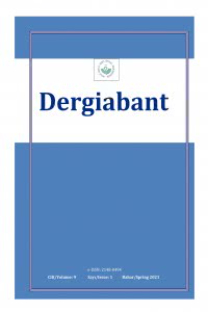İBN SÎNÂ’DA NİCELİKLERİN VARLIĞI
İbn Sînâ, Nicelikler, Realizm, Cevher, Araz
THE EXISTENCE of QUANTITIES in IBN SINA
Ibn Sina, Quantities, Realism, Substance, Accident,
___
İbn Sînâ, Kategoriler, (çev. Muhittin Macit), İstanbul: Litera Yayıncılık, 2010.İbn Sînâ, Metafizik, (çev. Ekrem Demirli ve Ömer Türker), İstanbul: Litera Yayıncılık, I, 2004; II, 2005.
Aristo, Metafizik, (çev. Ahmet Arslan), İstanbul: Sosyal Yayınlar, 1996.
Demirci, M. Fatih, “İbn Sînâ Felsefesinde Küllîler Meselesi”, (doktora tezi, Marmara Üniversitesi Sosyal Bilimler Enstitüsü, 2012).
Demirci, M. Fatih, “İbn Sînâ’da nicelikler ve sayı”, AİBÜ İlahiyat Fakültesi Dergisi, III/6 (2015), 21-41.
Fârâbî, Kitâbü’l-Vahid ve’l-vahde, nşr. Muhsin Mehdi, Dârülbeyzâ: Daru Tubkal, 1990.
Fârâbî, “Bir ve Birlik”, Fırat Üniversitesi İlahiyat Fakültesi Dergisi, (çev. Cevdet Kılıç), 13/2 (2008), 441-66.
Fazlıoğlu, İhsan, “Aristoteles’te Nicelik Sorunu”, (doktora tezi, İstanbul Üniversitesi Sosyal Bilimler Enstitüsü, 1998).
Karlığa, H. Bekir, “Cisim”, TDV İslâm Ansiklopedisi (DİA), VIII, 28-31.
Marmura, Michael E., “Avicenna’s Critique of Platonists in Book VII, Chapter 2 of the Metaphysics of His Healing”, Arabic Theology, Arabic Philosophy: from the many to the one, (edt. James E. Montgomery), Leuven : Uitgeverij Peeters en Departement Oosterse Studies, 2006, 355–369.
Meinwald, Constance C., “Good-bye to the third man”, The Cambridge Companion to Plato, (edt. Richard Kraut), Cambridge: Cambridge University, 1995, 365-96.
O'Shaughnessy, Thomas, “St. Thomas and Avicenna on the Nature of the One”, Gregorianum, XLI/4 (1960), 665-679.
- Yayın Aralığı: Yılda 2 Sayı
- Yayıncı: Abant İzzet Baysal Üniversitesi
KANT’IN LEİBNİZ’İN MONADOLOJİSİNDEKİ UZAY VE ZAMAN ANLAYIŞINI ELEŞTİRİSİ
BİR FÂKİHİN TASAVVUF YORUMU: AKİFZÂDE’NİN MÜHİMMÂTU’S-SÛFİYYE ADLI MAHTÛT ESERİ
HANEFÎ MEZHEBİNE HİNTLİ BİR YORUM: FERÂİZİYYE HAREKETİ
CEMAL HALVETİ’NİN “ESRÂRU’L-VUDÛ” ADLI RİSALESİ BAĞLAMINDA FIKIH-TASAVVUF İLİŞKİSİ
KASAS SÛRESİ 38. ÂYET BAĞLAMINDA KUR’ÂNI KERÎM’DEKİ TARİHSEL VERİNİN RASYONEL OLMADIĞI İDDİASI
İBRAHİM MUSTAFA’NIN NAHİV İLMİNİN ISLAHINA DAİR GÖRÜŞLERİ
ABDURRAHMAN B. EL-HÂC EBÛ BEKİR EL-KEFEVÎ’NİN MECMÛʿA-İ HUTBE İSİMLİ ESERİNDE HADÎS KULLANIMI
